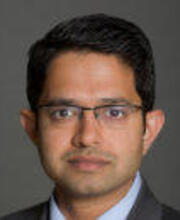Associate Professor of Radiology, Harvard Medical School
Jay is Lead Investigator at the Brigham and Women’s Hospital. Jay completed his Bachelors of Technology (B.Tech.) at the Indian Institute of Technology and Doctorate (PhD) from the University of Western Ontario, Canada. Thereafter, Jay joined the Brigham and Women’s Hospital as a postdoctoral research scholar. Jay’s research interest focusses on improving the ability of the surgeon intraoperatively. This involves three main areas of interest – surgical navigation to improve the surgeon’s visualization, robotics to improve their dexterity and machine learning to improve their computational ability.
To improve the surgeon’s visualization, Jay has developed navigation algorithms with deformation compensation for tracking and displaying the instrument tip position and shape in a 3D patient-specific anatomical display. This navigation system has been used for clinical applications including endoscopic biopsy of pancreatic tumors, lung wedge resection, breast conserving surgery, parathyroidectomy and ureteroscopy. Through the use of these navigation algorithms, the surgeon can precisely localize the tumor and surrounding structures to ensure complete tumor resection while avoiding the sensitive structures and compensating for tissue deformation. Jay has also been advancing cutting edge research in field of virtual, mixed and augmented reality to enhance the surgeon’s visualization.
As part his research focus on medical robotics, Jay has developed an active steerable catheter and control algorithms to perform haptics-enabled, robot-assisted catheter insertion for angioplasty and cardiac ablation. This has further laid the foundation for two current projects involving the development of a concentric tube robot for kidney stone treatment, and a robotic device with associated visual-control algorithms for ICE-guided cardiac ablation.
His third area of interest involving machine learning has led to the development of fast and robust deep-learning based segmentation and registration algorithms for intraoperative use. These algorithms minimize the computational burden for the surgeon while providing context-specific information intraoperatively.
Jay is currently the Principal Investigator on 3 NIH R01 grants and 1 Siemens funded grant, and also serves as a Co-investigator on the AT-NCIGT P41 grant. He is also an Adjunct professor at Western University and an Associate Member of the Broad Institute of MIT and Harvard.
